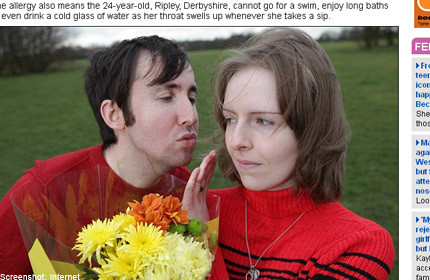Woman so allergic to water she cannot kiss fiancé


While most couples were out exchanging loving kisses on Tuesday, 24-year-old Rachel Prince from the UK has a rare medical condition that doesn't allow her to receive kisses - now or ever.
She is allergic to water. So allergic in fact, that even a few spots of saliva from Lee Warwick, her fiancé, will cause her to break out into terrible bout of itchy, red hives.
The condition is called aquagenic urthicaria, and means that Prince cannot swim, enjoy long relaxing baths, get caught in the rain, play sports or enjoy cold drinks.
Prince says it is "depressing" not being able to kiss and have that intimacy and closeness. When Lee gives her a kiss, she has to wipe it off immediately as leaving the moisture on her skin will trigger the allergic reaction.
However, her fiancé still makes her feel loved in other ways such as buying her little gifts.
Prince, who is unemployed due to another affliction, Cubital tunnel syndrome, met Warwick, an office temp, online 10 years ago. They slowly graduated into a relationship on Valentine's Day 2007.
Cubital tunnel syndrome is a condition brought on by increased pressure on the ulnar nerve at the elbow.
Some patients may notice weakness while pinching, occasional clumsiness, and/or a tendency to drop things. In severe cases, sensation may be lost and the muscles in the hand may lose bulk and strength.
On yet another Valentine's day, Mr Warwick proposed, and she accepted.
However, her allergy means that the couple will not be able to kiss, even on their wedding day.
Can't bleed, cry or sweat
Keeping her spirits up
Prince said the symptoms of the allergy first began appearing when she was 12 years old. As she got older, the rashes became worse when her skin came into contact with water.
"It burns and it itches. It feels like my skin is on fire," she said. She added that the rash appears all over her face, chest, arms, and even legs.
Her own blood and tears are taboo to her skin as well, meaning that she cannot bleed, cry, or sweat.
Elaborating on her condition, she says drinking water is an uncomfortable process which causes her throat to swell up. Substituting water with fruit juice and tea helps a little, but not much.
When she bathes, she gets in and out of the bath in a few minutes at most. Afterwhich, she is covered with an itchy and painful rash, which forces her to lie down and rest for some time after.
Prince said she receives many strange reactions and stares due to her condition. For example, she recounted the many times she was stared at when she entered restaurants after she was caught in the rain.
Having children in the future is also another problem. Prince said it is a topic that has to be carefully deliberated, as not only will she be unable to do basic chores to take care of them, she also fears passing on her condition to them.
However, Prince keeps her spirits up thinking of the brighter side of things.
For one, she is automatically exempted from doing the dishes or washing up.
"Sometimes I look at her and I really want to kiss her but I know I can't," Warwick said.
"I do sometimes get a bit fed up. I have to do most of the housework so I'm basically Rachel's slave and I don't even get a kiss at the end of it," he added.
However, he added a sweet sentence at the end: "But I don't mind really, she's worth it," he said.
No known treatment
Aquagenic Urticaria
Aquagenic Urticaria is a rare condition where a person is allergic to water. This means any contact with any liquid containing water causes the sufferer to develop painful, itchy hives all over the affected area.
The episodes can last anywhere between 10mins to an hour and a half.
Researchers say that the hives, while described as an allergy, is not a true histamine releasing allergic reaction like other forms of allergies.
This is as it is possibly the effect of different temperatures of water, such as cold or hot, and can flare up due to the reaction by extremely sensitive skin with chemicals in water such as chlorine.
It is extremely rare, and reports say there are only about 35 people around the world with the affliction.
There is no known treatment for aquagenic urticaria. Dermatologists recommend avoiding contact with water as much as possible by taking short showers, staying cool, and avoiding rain to ease symptoms.
Patients can also take medication such as Antihistamines, Zostrix, and other types of medications to help reduce the intensity of the reaction.